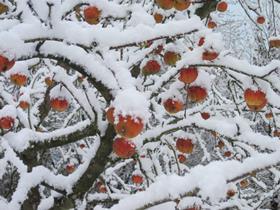
Fresh produce growers and retailers across the UK are recovering from crop delays and supply disruption after last week’s snow disrupted normal operations.
The ‘beast from the east’ and Storm Emma are estimated to have cost the UK economy £1 billion a day and could halve GDP growth in the first three months of the year, according to the Centre for Economicsand Business Research.
Widespread stock shortages were reported at supermarkets up and down the country, with pictures of empty shelves at all the major retailers cropping up on social media.
In the fresh produce industry, the impact of the storms has been widespread with carrot, brassica, onion, topfruit and soft fruit growers among those affected in some way.
The Asparagus Growers Association reported two-week delays to both tunnel crops, caused “as much by the cold as by the snow”, and pre-season fieldwork, caused by snow and wet conditions as crops thawed.
“Damage to polytunnel structures will add cost and take time to sort out,” the trade body added, but it said maincrop varieties were unlikely to be significantly affected unless the cold weather continues.
In carrots, the main delays have been to planting, with the establishment of 2018 crop halted by last week’s weather.
“With rain forecast, prospects for further drilling this week do not look good,” said the British Carrot Growers Association.“There may be some concerns over continuity of new season crop if drilling continues to be delayed significantly.”
The harvesting of carrots and parsnips is reported to have continued through the worst of the weather, with straw cover helping to maintain crop quality and allow for picking.
Despite this, delivery logistics were challenging, according to British Carrot Growers, and may have affected supply in parts of the country, particularly on packed product.
Brassica producers also reported logistical problems, with “lorries held up in snow and some depots closed for one or two days”. This had an impact on deliveries to stores, the Brassica Growers Association added.
In onions, planting and drilling was put on hold but most people continued to pack and produce, according to British Onions.
Meanwhile in topfruit, packhouse production was “mostly unaffected” although planting was delayed and no harvesting activity was planned.
The impact on supply was minimal, according to the outgoing chief executive of English Apples and Pears, Steven Munday, with demand for domestic apples declining steadily through the spring to the end of the season.
In soft fruit, BerryWorld’s Chloe Butler said the company would “have to wait until the colder weather has abated” before it can assess its losses, if any, in tunnelled outdoor production.
“Overall, the weather in February has very little impact on crop timing, as generally we experience low temperatures and don't see a great deal of growth during this period,” she added.



